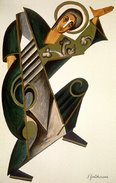Dubium fiat!
Dubium fiat! What creationists want to do is to use intelligent design (ID) to drive a wedge of uncertainty into the theory of evolution. Or rather, there's already a crack of uncertainty in all scientific theories; and ID proponents want to widen that crack to a full-blown fissure.
However, if the goal is to make the creationism alternative more credible, they are using the wrong tool to do so. Doubt, once engaged, will easily be turned against ID as well. This is a point that both pro- and anti-ID people don't get: doubt is good for science but bad for religion. So science teachers should welcome doubt into their classrooms. See what happens when doubt and scientific thinking are applied to ID itself.
If ID is taught in school science class, it could follow along these lines:
- biological complexity exists and:
- on average, biological complexity has increased over time (possibly from zero)
- there is biological complexity in all organisms, thought the change may have been different for different species/environments.
- changes in biological complexity have applied throughout time, possibly at different rates
- to explain (A), either
1. there's no biological complexity-creating agent - ie, theory of evolution
2. there are biological complexity-creating agent(s) - ie, ID
This view branches:
- There is one agent for all biological complexity. We can call this agent the god of evolution. We don't know if this god can do other things besides create biological complexity. We don't know whether there are other gods for other 'intelligent' or complex effects (that is, a god of geology). If there is only one such agent and that agent can only create biological complexity, we can make this statement of equivalency God = Evolution (call this evotheism).
- There are numerous agents.
- One agent per function. That is, one agent for the creation of eyes, another for the creation of legs, another, of wings, etc.,.
- One agent per species. That is, one agent for muskrats, another agent presiding over clover. A species agent is born when the species arrives (a somewhat fuzzy concept), gives birth to new agents when the species branches, and dies when the species becomes extinct. There could also be competition among the species agents for resources and an evolution of species agents (a notion that Stephen Jay Gould called species selection).
- Some other partition of biological complexity-creating duties. By time: an agent for the Cambrian period, one for the Triassic period, etc. By location: an agent for land animals, one for marine plants, etc.
As you see, ID leads to a number of interesting branches. Most ID proponents don't want the branching to be taught in school. Why? Because their goal is to put doubt into evolution and to follow up that doubt by creationistic, ie, biblical, teaching (a subset of (2a)) in churches. But once they open ID for discussion, why should we stop with a statement of doubt? We should follow ID to its implications: a multitude of agent-oriented theologies.
ID is valuable for science. It brings doubt back into the picture. And doubt is a wonderful creator of new thoughts. Maybe there is an agent of uncertainty which spawns new thinking; we could call it the god of doubt. Or maybe there's one God that said, Dubium fiat (Let there be doubt) and it was good.

No comments:
Post a Comment